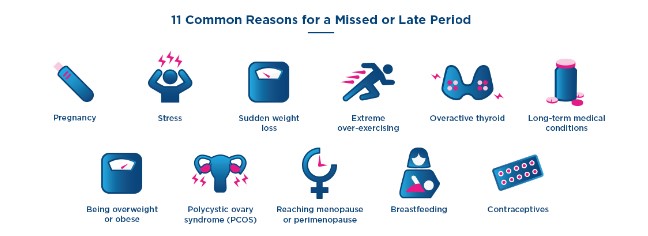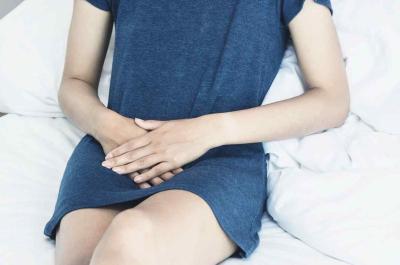
Missing your period can be stressful. You worry about whether you’re pregnant or not, or whether there is something wrong with you. Although pregnancy and illness can cause your period to be late or not come at all, there are also other factors like stress or the natural variation in your menstrual cycle that can cause your period to arrive late. Read on to learn all about what causes missed periods.
- If you’ve had unprotected sex and your period is late, take a home pregnancy test to find out if you’re pregnant or not
- You may also have a late or skipped period due to stress, sudden weight loss, excessive exercise, being overweight, breastfeeding, approaching menopause, or taking some contraceptives
- Some long-term medical conditions, like an overactive thyroid, polycystic ovarian syndrome, diabetes, and heart disease can also cause your periods to stop or become irregular.
- Many women have irregular cycles due to natural variation.
Missed periods and pregnancy
If you’ve had unprotected sex, you may have missed your period because you’re pregnant. You may want to rule out pregnancy first by taking a pregnancy test, or you can see if you need to take a test with our “Am I pregnant” quiz.
Keep an eye out for any early pregnancy symptoms, like:
- tender breasts
- morning sickness
- frequent urination
- fatigue
These symptoms coupled with a missed period could mean you are pregnant
I’m not pregnant, so why is my period late?
So the pregnancy test came out negative, and you still haven’t got your period, what then? There are many reasons why you may miss or skip a period, or why your periods may stop altogether.
If pregnancy cannot be ruled out after a negative test result, you may be late or have skipped your period due to:

- Stress: This can be one of the main reasons for late or skipped periods. Take some time to relax, get regular exercise, or even do some breathing exercises to manage your stress.
- Sudden weight loss: This can cause your periods to stop, as severe calorie restriction or eating disorders can stop the production of the hormones you need for ovulation.
- Extreme over-exercising. Excessive exercise and intense physical activity can cause hormone imbalances.
- Overactive thyroid: Thyroid disease can interfere with your cycle.
- Long-term medical conditions: Some conditions like heart disease or diabetes can cause missed or irregular periods.
- Being overweight or obese: Excess weight or weight gain can cause your body to produce too much estrogen, which can affect your menstrual cycle.
- Polycystic ovary syndrome (PCOS): Polycystic ovaries have many underdeveloped sacs in which eggs develop, and often these are unable to release an egg, and you won’t ovulate. PCOS affects one in every ten women in the UK and is responsible for one in three cases of irregular periods.
- Reaching menopause or perimenopause: As you approach menopause, which usually occurs between the ages of 45 and 55, your estrogen levels will start to decrease, and you may ovulate less often. Some women, around 1 in 100, experience premature menopause which happens before the age of 40. If you have not had your period for 3 months and are under 45 years, see your doctor.
- Breastfeeding: If you’re breastfeeding, you may find your periods can be irregular or absent. You may even not have a period until you stop breastfeeding, but that doesn’t mean you aren’t fertile so make sure you use contraception if you don’t want to get pregnant again yet.
- Contraceptives: Some types of contraceptives, like the progesterone-only birth control pill, the contraceptive injection, or the intrauterine system (IUS) can cause your periods to stop entirely.
There are many reasons why your period is late or skipped, and most, like stress, are no cause for alarm and your periods can return to normal with a few healthy lifestyle changes.
However, to rule out any causes for concern, if you miss more than one period you may want to see your doctor for medical advice.
Am I really late?
You may think your period is late, but it could just be a natural variation from your usual cycle. Many women see some variation month to month in their cycle, usually around two or three days, so you may get your period on day 27 one month, and on day 33 another. However, for some women the variance is even larger, where 46% of cycles can shift by 7 days or more, and 20% by 14 days or more.
Each woman has a different cycle, and as you age and get closer to menopause, you may notice your cycles get more irregular, too. If you’re not doing so, tracking your menstrual cycles can help you find out what’s normal for you and how much variation there is. If you have any concerns, then talk to your doctor.

Get a pregnant result as fast as 1 minute from the day you miss your period
Clearblue Rapid Detection Pregnancy Test has been designed to offer you the easiest pregnancy testing experience, with the accuracy you expect from Clearblue – and a result as fast as 1 minute.
A pregnant result may appear in 1 minute when testing from the day of the missed period. Wait 3 minutes to confirm a not pregnant result.

Am I pregnant (Quiz)?
If you can't buy a pregnancy test right now, try our quick “Am I pregnant?” quiz to see if your symptoms might be an early clue.




